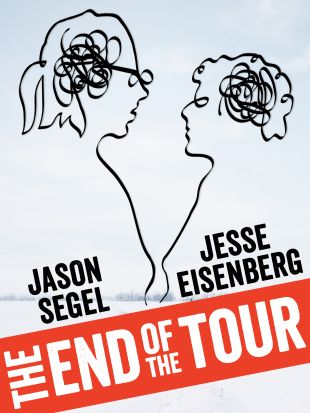
There have been many exhumations in cinema this year: Kurt Cobain (Montage of Heck), Eazy-E (Straight Outta Compton), Amy Winehouse (Amy), and now this feature adaptation of journalist David Lipsky's Although Of Course You End Up Becoming Yourself, his memoir of the five days in 1996 he spent tailing David Foster Wallace on the last leg of his book tour for Infinite Jest, for a Rolling Stone profile that was never published. Wallace at that time was newly anointed as the greatest new American writer, and his simultaneously sprawling and dense 1079-page magnum opus, about an American near-future awash in compulsive entertainment, corporate ubiquity and addictions of all stripes, was the talk of the town in precisely the way Lipsky's own debut novel was not.
The ghost of Amadeus hovers over The End of the Tour, because both movies precisely capture the special agony of being gifted enough to recognize genius -- that rare quality Schopenhauer described as "hitting the target no one else can see" -- but not gifted enough to conjure it up oneself. But while Amadeus takes place within the splendiferous pomp of royal Vienna, The End of the Tour's milieu is the gray-blue vista of mid-'90s Bloomington, Illinois, and the genius on display is Wallace (Jason Segel), a shaggy man-mountain in hoodie and kerchief, holed up in a single-story ranch house with no companions except his two rambunctious Labradors. Wallace is past his prodigy years when Lipsky pays his visit -- he's 34, a respectable age for a novelist to come into full flower -- but what a flower Infinite Jest is, as big and broad and attention-grabbing as one of those gigantic corpse flowers that blooms once a decade, and Wallace is slightly embarrassed about how its far-wafting fragrance is stinking up his quiet existence. This is the mid-'90s, after all, and seeking fame for its own sake contradicts the Gen-X ethos of flying low and sincere under the mendacious mainstream culture's radar.

This ambivalence is something the more baldly ambitious Lipsky (Jesse Eisenberg) cannot understand. Over the next five days, as the men venture out to a reading in Minneapolis, Lipsky sublimates his sycophantic desire by comprehensively cataloging this great man, as if noticing how he takes his pickles off his burgers would unlock the secret of his talent. But after travel fatigue and misunderstandings have set in, Lipsky can't hide his resentment of Wallace's outsized gifts. In a memorable scene, he laceratingly accuses Wallace of being "faux," of hiding his intellectual endowment under an aw-shucks, Pepsi-drinking everyman persona. Wallace denies it, but there's some truth to what he's saying. Wallace, former high-school jock, was both physically and intellectually mammoth. People of that size get in the habit of pulling all their punches so as not to hurt the smaller people around them, a habit that becomes so engrained they eventually fool themselves about their power. Lipsky isn't fooled. "You don't crack open a 1000-page book," he bitterly concludes, "because you heard the author is a regular guy."
That rat-a-tat repartee between the two men is what constitutes the meat of The End of the Tour, and it's a tour de force not only for Eisenberg, who'd previously proved his agility with dense dialogue in The Social Network, but for Segel, who is a revelation. The gimmick of his casting goes away quickly and we're left only with Wallace -- quietly anxious, earnest, lonely, prophetic about how the Internet-infused remainder of the 20th century would unfold, in a way that gave him no pleasure in being right, and utterly, immensely talented. This Cain and Abel story of American letters is infused with the pall of Wallace's 2008 suicide, but in an onscreen eulogy, Lipsky praises Wallace's work for forcing the reader's eyes open, making them hungry and eager for more. Every frame of The End of the Tour does the same.
